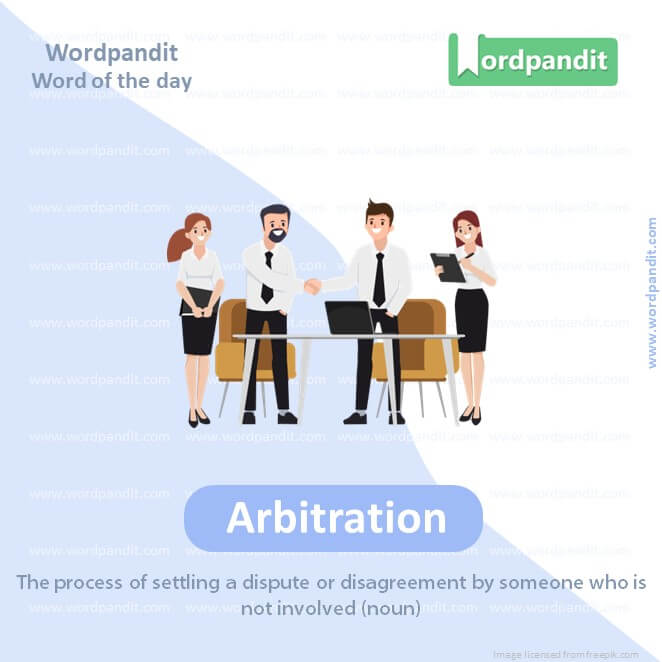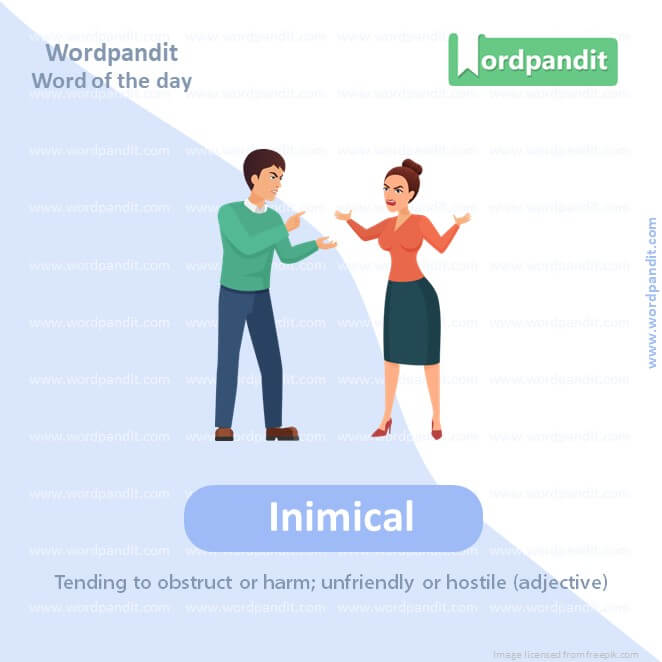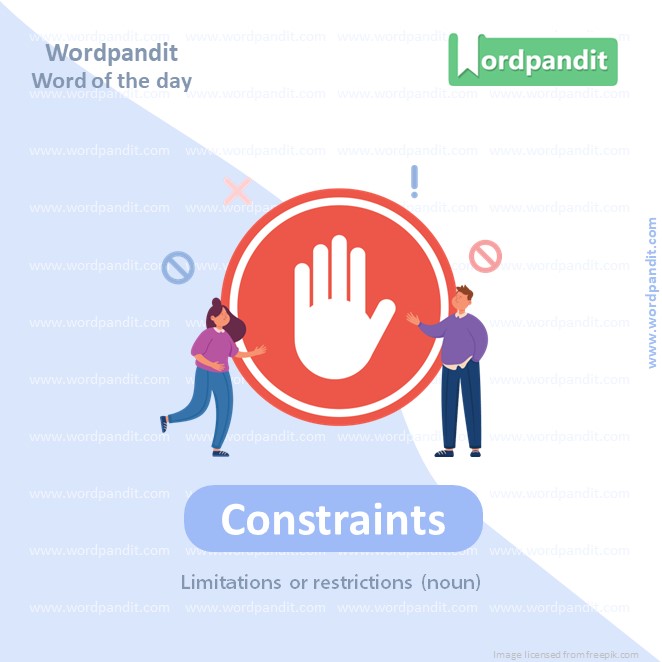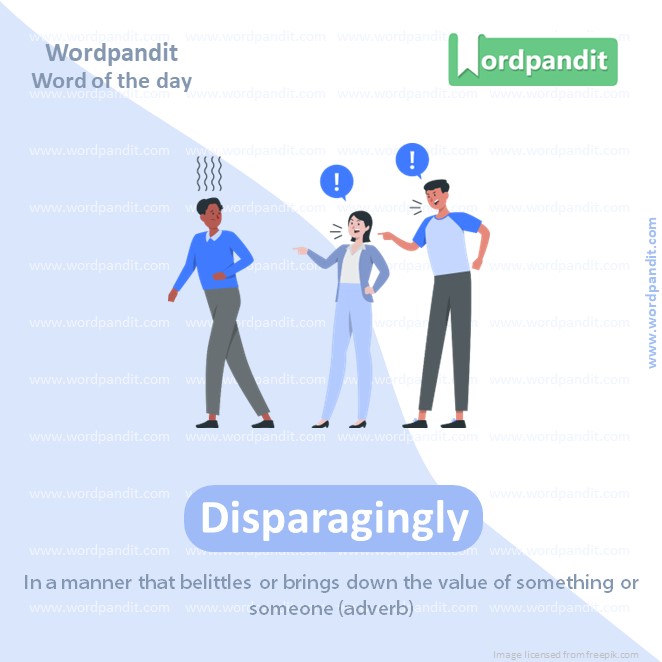Daily Vocabulary Words: List of Daily Used Words in Leading Indian Newspapers
Hi there. Welcome to this special section @ Wordpandit. Our endeavour here is straightforward: highlighting daily vocabulary words that you would come across in leading newspapers in the country. We have included the following newspapers in our selection:
• The Times of India
• The Economic Times
• Hindustan Times
• Mint
• Indian Express
We are putting in extensive work to develop your vocabulary. All you have to do is be regular with this section and check out this post daily. This is your repository of commonly used words; essentially, we are posting a list of daily used words. Hence, this has significant practical application as it teaches you words that are commonly used in leading publications mentioned above.
Visit the website daily to learn words from leading Indian newspapers.
WORD-1: Flamboyant
CONTEXT: Advaniji is more a man of deeds and less of words. He is not flamboyant.
SOURCE: Indian Express
EXPLANATORY PARAGRAPH: Imagine wearing a really bright, sparkly costume with lots of colors and feathers, kind of like a peacock showing off its beautiful feathers. Flamboyant is when something or someone looks very showy, colorful, and stands out a lot because it’s so eye-catching and pretty.
MEANING: Showing a lot of confidence and style in a way that attracts attention (adjective).
PRONUNCIATION: flam-BOY-ant
SYNONYMS: Showy, Flashy, Colorful, Vibrant, Ostentatious, Extravagant, Vivid
USAGE EXAMPLES:
1. The artist’s flamboyant dress made her the center of attention at the gallery opening.
2. He made a flamboyant entrance at the party with his glittery suit.
3. The flamboyant decorations made the carnival feel magical and lively.
4. The parade was filled with flamboyant floats and costumes.
WORD-2: Crippled
CONTEXT: the appellate body (AB) stands crippled because the US has single-handedly blocked the appointment of new members.
SOURCE: Indian Express
EXPLANATORY PARAGRAPH: Think about a toy robot that can’t walk or move one of its arms because something’s broken or not working right. Crippled means when someone or something is not able to move or do things normally because of an injury or damage.
MEANING: Unable to walk or move properly due to injury or disability (adjective).
PRONUNCIATION: KRIP-uhld
SYNONYMS: Disabled, Handicapped, Injured, Impaired, Incapacitated, Lame, Debilitated
USAGE EXAMPLES:
1. The accident left him crippled, making it hard for him to walk without help.
2. The old tree was crippled by the storm, losing many of its branches.
3. The company was crippled by debt, struggling to keep its doors open.
4. After the virus, the computer system was crippled and barely functioning.

WORD-3: Arbitration
CONTEXT: The first option is to join the European Union-led multi-party Interim Appeal Arbitration Arrangement (MPIA), which formalises the mechanism for arbitration already available under the WTO to provide the appellate review for panel reports.
SOURCE: Indian Express
EXPLANATORY PARAGRAPH: Imagine if you and your friend can’t decide which game to play, so you ask someone else, like a teacher, to make the decision for you. Arbitration is when people can’t agree on something, so they let another person or group decide for them.
MEANING: The process of settling a dispute or disagreement by someone who is not involved (noun).
PRONUNCIATION: ahr-bi-TRAY-shuhn
SYNONYMS: Mediation, Conciliation, Settlement, Resolution, Negotiation, Adjudication, Reconciliation
USAGE EXAMPLES:
1. The two companies went to arbitration to solve their disagreement about the contract.
2. The worker and the employer settled their dispute through arbitration.
3. Arbitration helped the neighbors resolve their argument about the property line.
4. The arbitration panel decided on a fair compensation for the damaged goods.
WORD-4: Distortions
CONTEXT: He spared no effort to correct historical distortions and insults to the idea of India.
SOURCE: Indian Express
EXPLANATORY PARAGRAPH: Imagine looking in a funny mirror at the carnival that makes your body look all stretched or squished. Distortions are when things get twisted, changed, or made to look different from what they really are.
MEANING: The act of twisting or altering something out of its true, natural, or original state (noun).
PRONUNCIATION: dis-TOR-shuhns
SYNONYMS: Twists, Misrepresentations, Warps, Alterations, Deformations, Perversions, Skewings
USAGE EXAMPLES:
1. The funhouse mirrors created amusing distortions of our shapes.
2. The story had several distortions of the actual events.
3. He criticized the distortions in the news report.
4. The heat caused distortions in the vinyl record, making it unplayable.
WORD-5: Unleashing
CONTEXT: The role and contribution of Advaniji in unleashing this power of nationalism will be firmly etched in the history of modern India.
SOURCE: Indian Express
EXPLANATORY PARAGRAPH: Imagine you have a pet dog on a leash and you unclip the leash in the park so it can run around freely. Unleashing is like letting something go or setting it free to do what it wants.
MEANING: Releasing or letting loose suddenly and powerfully (verb).
PRONUNCIATION: un-LEESH-ing
SYNONYMS: Releasing, Liberating, Unloosing, Freeing, Unchaining, Letting go, Emitting
USAGE EXAMPLES:
1. The company is unleashing a new wave of innovative products.
2. The storm unleashed heavy rain and strong winds across the coast.
3. She unleashed her anger in a passionate speech.
4. The movie unleashed a lot of emotions, making many viewers cry.

WORD-6: Inimical
CONTEXT: It will also be inimical to the interests of countries like India. Even if the US does not like AB’s jurisprudence, the fact remains that the AB, over the years, has clarified the meaning of WTO law.
SOURCE: Indian Express
EXPLANATORY PARAGRAPH: Think about a character in a story who is always making things difficult for the hero, like putting obstacles in their way or trying to stop them from achieving their goal. Inimical is when something is harmful or acts like an enemy.
MEANING: Tending to obstruct or harm; unfriendly or hostile (adjective).
PRONUNCIATION: i-NIM-i-kul
SYNONYMS: Hostile, Adverse, Unfriendly, Harmful, Antagonistic, Opposing, Detrimental
USAGE EXAMPLES:
1. The harsh weather was inimical to our plans for a picnic.
2. His inimical attitude made it difficult to work with him.
3. The policy is inimical to the interests of small businesses.
4. Inimical forces were trying to undermine the peace process.

WORD-7: Constraints
CONTEXT: Will inequality pose a constraints to future growth? Are early childhood health indicators, which affect several adult-life indicators, not improving as fast as needed? We can only speculate.
SOURCE: Indian Express
EXPLANATORY PARAGRAPH: Imagine you want to run around and play, but you have to stay inside because it’s raining. Constraint is when you’re limited or held back from doing what you want.
MEANING: Limitations or restrictions (noun).
PRONUNCIATION: kuhn-STRAINT
SYNONYMS: Restriction, Limitation, Confinement, Inhibition, Restraint, Control, Boundary
USAGE EXAMPLES:
1. The budget constraints limited how much we could spend on the project.
2. Time constraints made it hard to finish the work by the deadline.
3. The small room was a constraint on the number of guests we could invite.
4. Legal constraints prevented the company from proceeding with the plan.

WORD-8: Disparaging
CONTEXT: the tension between India and the Maldives heightened when the latter’s minister made disparaging remarks against Prime Minister Narendra Modi for his Lakshadweep trip.
SOURCE: Hindustan times
EXPLANATORY PARAGRAPH: Imagine someone saying mean things about your favorite drawing, telling you it’s not good without even being nice about it. Disparaging is when someone talks down about something or someone, making it seem less important or good.
MEANING: In a manner that belittles or brings down the value of something or someone (adverb).
PRONUNCIATION: dis-PAR-uh-jing
SYNONYMS: Belittling, Derogatory, Depreciating, Dismissive, Demeaning, Detractive, Scornful
USAGE EXAMPLES:
1. The teacher’s disparaging comments hurt the student’s feelings.
2. He made a disparaging remark about her cooking.
3. Disparaging views on the new policy were discussed in the meeting.
4. The article was full of disparaging comments about the celebrity.
WORD-9: Lodged
CONTEXT: India had lodged a formal protest with the Maldives government.
SOURCE: Hindustan times
EXPLANATORY PARAGRAPH: Think about a bird making a nest in a tree and staying there. Lodged is when something is placed firmly in a spot or when someone stays in a place, like a hotel or a cozy cabin.
MEANING: Fixed or stuck in a particular place; also, staying temporarily in a place (verb).
PRONUNCIATION: lojd
SYNONYMS: Embedded, Stuck, Fixed, Planted, Inserted, Entrenched, Accommodated
USAGE EXAMPLES:
1. A piece of food was lodged between her teeth.
2. They lodged in a quaint inn during their vacation.
3. The complaint was formally lodged with the council.
4. The bullet lodged in the wall, narrowly missing him.
WORD-10: Delighted
CONTEXT: I am delighted that the Government of India, under the visionary leadership of Prime Minister Narendra Modi, has rightly conferred the highest civilian award, Bharat Ratna, on Advaniji for his multi-faceted contribution to enriching our public life and thought.
SOURCE: Indian Express
EXPLANATORY PARAGRAPH: Imagine your face lighting up with a big smile because you just got the best surprise ever, like a birthday party with all your friends and your favorite cake. Delighted is feeling really happy and pleased about something.
MEANING: Feeling or showing great pleasure (adjective).
PRONUNCIATION: de-LIGHT-ed
SYNONYMS: Pleased, Happy, Joyful, Thrilled, Elated, Excited, Overjoyed
USAGE EXAMPLES:
1. She was delighted to receive the gift from her friend.
2. The children were delighted by the clown’s performance.
3. He was delighted with the outcome of the meeting.
4. They were delighted to be invited to the celebration.
Vocabulary Synonyms
In the intricate weave of language learning, ‘vocabulary synonyms’ emerge as a key element that adds depth and variety to expression. These different words with similar meanings enrich our vocabulary, enabling us to communicate with precision and clarity. However, grasping ‘vocabulary synonyms’ successfully warrants a systematic approach.
When approaching ‘vocabulary synonyms’, context is your compass. Engage with various reading materials like novels, newspapers, and digital content to explore and understand how these synonyms are used in different situations. This exposure will fortify your comprehension of ‘vocabulary synonyms’ and their usage nuances.
Employing memory-enhancing techniques can cement your grasp on ‘vocabulary synonyms’. Employing flashcards is an effective method where one side contains the word you know, and the other side has its synonyms. Also, creating mind maps, linking the known word to its various synonyms, can be an engaging way to learn ‘vocabulary synonyms’.
To master ‘vocabulary synonyms’, take an active role in application. Regular conversations, written communications, digital interactions – all of these offer ample opportunities to utilize learnt synonyms. This practice refines your application and accelerates internalization of ‘vocabulary synonyms’.
Embracing language exchange platforms or engaging with native speakers can provide invaluable feedback on the usage of ‘vocabulary synonyms’. This interaction can further enhance your understanding of the cultural idiosyncrasies of word usage.
In conclusion, learning ‘vocabulary synonyms’ is a rewarding pursuit that adds layers of complexity to your language skills. A thoughtful blend of diversified resources, memory tools, practice, and interactive learning can make the task of mastering ‘vocabulary synonyms’ an enjoyable and fruitful journey. Every synonym learnt paints your vocabulary with different shades of understanding, making your language canvas all the more vivid and spectacular!













